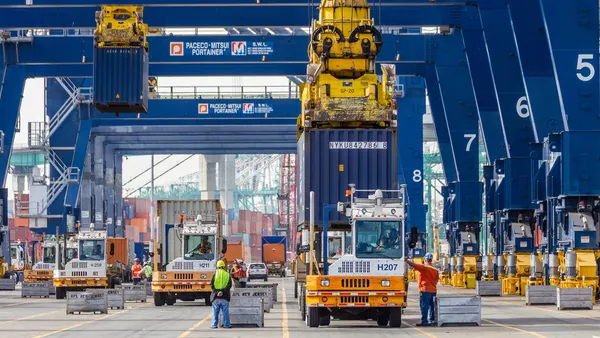Dive Brief:
- A.P. Moller-Maersk, the Danish shipping line, has agreed to acquire German shipping line Hamburg Sud from the Oetker Group. The acquisition establishes Maersk as the world's largest container shipping line.
- Previously, Hamburg Sud's asking price had been reported at $5 billion, but it is being widely reported that the ultimate sale price was closer to $4 billion, although terms have not been officially disclosed. Hamburg Sud recorded $6.7 billion in revenues last year.
- The acquisition, set to close by the end of 2017, brings Maersk's market share to 18.6% of global container trade, up from 15.7%. Maersk has recently suffered two consecutive quarters of losses; while the company believes profitability will return soon, there is no clear indication how quickly this deal will become accretive to earnings.
Dive Insight:
Consolidation in the supply chain continues apace, as Hamburg Sud has become the latest big container line to be acquired by a larger competitor. As the shipping industry continues to attempt to survive the shocks of one of its deepest economic downturns in recent history, smaller companies with established lines, such as Hamburg, have been obvious targets. Even as their asking price of $5 billion was likely too high, Hamburg Sud had multiple suitors, including CMA CGM, which entered the bidding arena yesterday.
Ultimately Hamburg Sud agreed to terms with Maersk, possibly in part due to CMA CGM's rising debt ratio, which would have both impacted the bidding price as well as posed a long-term threat to profitability. Maersk has long been an industry leader and is likely a more ideal acquirer of the Oetker family's nearly 150 year old shipping company.
The container shipping industry, which had become badly fragmented as well as over-invested in new shipping vessels and technology, has become fertile ground for consolidation that may be the only means for the industry to survive. Never-the-less, big challenges remain for the industry at large and Maersk in particular, as the economies of scale through size of ship only matter if capacity for a full load is met. Otherwise, the overabundance of bulk vessels, combined with reduced shipping demand, will further erode profitability, regardless of how many shipping lines are being run.













